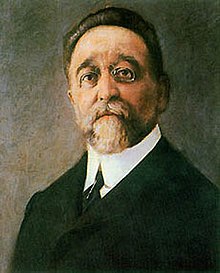Loading AI tools
Spanish composer From Wikipedia, the free encyclopedia
Ruperto Chapí y Lorente (27 March 1851 – 25 March 1909) was a Spanish composer, and co-founder of the Spanish Society of Authors and Publishers.
You can help expand this article with text translated from the corresponding article in Catalan. (November 2023) Click [show] for important translation instructions.
|

Chapí was born at Villena, the son of a local barber. At just nine years old, he joined the Música Nueva band (current Villena Municipal Band) where he would soon become a virtuoso and of which he would end up being director at only 15 years old. He would gain some fame as an interpreter in the surroundings of the Moors and Christians Festival of Villena, also being highly sought after in those of other nearby towns. In the Valencian-speaking towns, to the north and northeast of Villena, he was popularly known as "el xiquet de Villena" and they continually disputed hiring him, given his brilliance.
He keep training in his home town and in Madrid when he was 16 years old. He wrote many symphonic, band, choral and chamber works, as well as zarzuelas and operas, becoming, alongside Tomás Bretón, a fellow pupil of Emilio Arrieta at the Madrid Conservatory. He was one of the most popular and important composers of his time. He wrote zarzuelas in all shapes and sizes, including the three-act zarzuela grande and the one-act género chico forms. His most celebrated work is La revoltosa, written in the latter style. Many of the preludes to his zarzuelas (including those to El tambor de granaderos and La patria chica) have remained staple items in Spanish orchestral concerts.
He died in Madrid in 1909.
Seamless Wikipedia browsing. On steroids.
Every time you click a link to Wikipedia, Wiktionary or Wikiquote in your browser's search results, it will show the modern Wikiwand interface.
Wikiwand extension is a five stars, simple, with minimum permission required to keep your browsing private, safe and transparent.